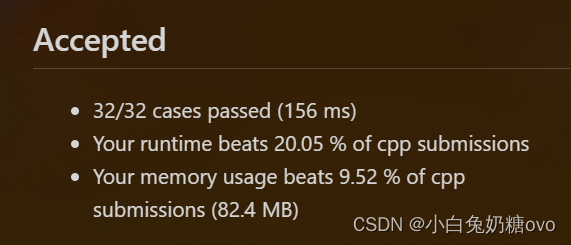给你一个字符串 s,请你将 s 分割成一些子串,使每个子串都是 回文串 。返回 s 所有可能的分割方案。
回文串 是正着读和反着读都一样的字符串。
示例 1:
输入:s = "aab"
输出:[["a","a","b"],["aa","b"]]
示例 2:
输入:s = "a"
输出:[["a"]]
提示:
1 <= s.length <= 16
s 仅由小写英文字母组成
AC:
/** @lc app=leetcode.cn id=131 lang=cpp** [131] 分割回文串*/// @lc code=start
class Solution {
private:vector<string> path;vector<vector<string>> result;bool isPalidrome(string& s, int start, int end) {for(int i = start, j = end; i < j; i++, j--){if(s[i] != s[j])return 0;}return 1;}void backtracking(string& s, int startIndex) {if(startIndex == s.size()){result.push_back(path);return ;}for(int i = startIndex; i < s.size(); i++) {if(isPalidrome(s, startIndex, i)) {string str = s.substr(startIndex, i - startIndex + 1);path.push_back(str);backtracking(s, i + 1);path.pop_back();}}return ;}
public:vector<vector<string>> partition(string s) {result.clear();path.clear();backtracking(s, 0);return result;}
};
// @lc code=end

第一次提交的时候,出现了没使用&引用类型,但是通过了?
有没有大佬帮忙解释下,不使用&浪费的空间资源以及其底层逻辑?
/** @lc app=leetcode.cn id=131 lang=cpp** [131] 分割回文串*/// @lc code=start
class Solution {
private:vector<string> path;vector<vector<string>> result;bool isPalidrome(string s, int start, int end) {for(int i = start, j = end; i < j; i++, j--){if(s[i] != s[j])return 0;}return 1;}void backtracking(string s, int startIndex) {if(startIndex == s.size()){result.push_back(path);return ;}for(int i = startIndex; i < s.size(); i++) {if(isPalidrome(s, startIndex, i)) {string str = s.substr(startIndex, i - startIndex + 1);path.push_back(str);backtracking(s, i + 1);path.pop_back();}}return ;}
public:vector<vector<string>> partition(string s) {result.clear();path.clear();backtracking(s, 0);return result;}
};
// @lc code=end

另外附上,最接近一段时间学习回溯算法的总结:
void backtracking(参数) {if (终止条件) {存放结果;return;}for (选择:本层集合中元素(树中节点孩子的数量就是集合的大小)) {处理节点;backtracking(路径,选择列表); // 递归回溯,撤销处理结果}
}
------------ 诸君,共勉! ---------------





)


)

![【数据科学】Scikit-learn[Scikit-learn、加载数据、训练集与测试集数据、创建模型、模型拟合、拟合数据与模型、评估模型性能、模型调整]](http://pic.xiahunao.cn/【数据科学】Scikit-learn[Scikit-learn、加载数据、训练集与测试集数据、创建模型、模型拟合、拟合数据与模型、评估模型性能、模型调整])
——JSX、TSX语法详解)

和(**)的用法)





